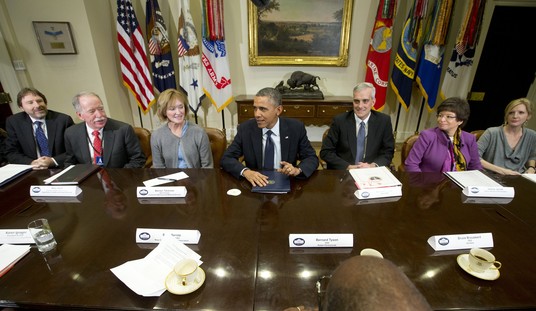Here’s the easiest prediction in American politics. If Trump gets reelected and if Barr stays on as Attorney General — and Trump will want him to — then Barr will be impeached next year. (This also assumes Democrats hold the House, but that’s a safe assumption.) Given all the smoke billowing from the DOJ right now, I think House Dems would impeach him before the end of the summer if not for the fact that it would distract the party in the stretch run of a presidential campaign.
Yes, sure, it’d be another futile effort since there’s little chance that the Senate would remove Barr. Even if the chamber turns blue this fall, a Democratic Senate would still need something like 15 Republican votes to reach a two-thirds majority to remove. Highly unlikely, if not quite as completely unlikely as Trump’s removal was. But removal isn’t the point. Remember that after Trump was impeached in December, Pelosi happily chirped to reporters that no matter what happened in the Senate, Trump would remain impeached forever. He might end up keeping his job but the impeachment stigma would never wash off. That’s how they’re going to approach it when they eventually impeach Barr too.
Aaron Zelinsky is an Assistant U.S. Attorney who works in Maryland. He joined Mueller’s team and was one of four “line prosecutors” charged with running the case against Roger Stone. He got the conviction and he and his colleagues prepared a sentencing memo for the court, in line with the factors that the U.S. sentencing guidelines set forth. That’s almost a mathematical calculation; prosecutors add and subtract “points” based on various incriminating and mitigating aspects of the defendant’s conduct to determine how stiff the recommended sentence should be. That’s when things started getting sticky, though. Shortly before the sentencing hearing, news leaked that the line prosecutors were at odds with their bosses at DOJ headquarters, who wanted a more lenient sentence for Stone. In the end the line prosecutors were allowed to file their original sentencing memo and seek a stiff sentence.
What followed was extremely irregular. The DOJ retracted the sentencing memo and substituted a new one, not authored by the line prosecutors, which requested less prison time for Stone. All four line prosecutors, including Zelinsky, withdrew from the case in protest. One, Jonathan Kravis, quit his job at the DOJ entirely over it. The obvious question afterwards: Was the “retraction” as bad as it looked? Did the DOJ leadership actually intervene in the case at the last minute to cut Roger Stone a break for the obnoxiously corrupt reason that he’s a buddy of the president’s?
Yeah, says Zelinsky. That’s exactly what happened. He’ll swear to this statement under oath tomorrow morning before Jerry Nadler’s House Judiciary Committee:

How irregular was it for the Department to seek a sentence below what the guidelines recommended for a defendant who’d forced them to go to trial and never repented of his crimes? If you believe Zelinsky, it was unheard of:

Who was it, specifically, who told him that acting U.S. Attorney Timothy Shea had “political” reasons for wanting Stone’s sentence reduced? Zelinsky doesn’t say, mentioning an unnamed “supervisor,” but that’ll be a key question tomorrow at the hearing. Was this office gossip or was he hearing from someone in a position to know that cronyism drove the thinking on Stone’s sentencing, plain and simple? He also never mentions Barr by name in his statement but the reference to “the highest levels of the Justice Department” seems clear enough:


It’s worth recalling how Tim Shea became the acting U.S. Attorney in D.C., and thus Zelinsky’s boss. The U.S. Attorney who presided over most of the Stone case was Jessie Liu. In late 2019 Trump nominated Liu to become an undersecretary at the Treasury Department. Normally a nominee will stay on their current job until they’re confirmed by the Senate for their new one, but Liu was “unexpectedly” removed from the D.C. U.S. Attorney’s office by Barr just weeks before Stone’s sentencing and replaced by Shea, one of Barr’s top advisors. On February 12, a day after Zelinsky and his colleagues quit in protest over the Stone sentencing fiasco and just days before Liu was set to testify before the Senate for her confirmation hearing, Trump yanked her Treasury nomination. What had she done to displease him?
While head of the US Attorney’s Office in Washington, Liu inherited many of the major ongoing cases from Robert Mueller’s special counsel investigation and was also handling the politically charged case of former FBI Deputy Director Andrew McCabe, a frequent target of Trump’s ire who is also a CNN contributor.
As Trump and administration officials weighed pulling Liu’s nomination to serve as the Treasury Department’s under secretary for terrorism and financial crimes, a central factor in the talks was how she had run the US Attorney’s Office. The problem wasn’t that she necessarily did anything wrong, one person familiar with the thinking said, but that she didn’t do more to get involved in those cases…
According to a separate source familiar with the situation, despite multiple warnings from people around her that there was a campaign actively working against her, Liu was blindsided when her second potential nomination in a year fell apart.
To outward appearances, it looks like Liu wasn’t doing enough to cut sweetheart deals for the president’s friends and so someone at the top — Trump? Barr? — decided to kick her upstairs to the Treasury Department and replace her with a Barr toady, Tim Shea, who’d be more amenable. Coincidentally, what just happened to Geoffrey Berman in the U.S. Attorney’s office for the Southern District of New York appears to follow that same M.O. Berman was also overseeing investigations that might end up implicating the president’s friends, from Rudy Giuliani to members of his inaugural committee. Berman was also reportedly offered a promotion, to the DOJ’s Civil Division, to ease the pain of his ouster. Berman was also set to be replaced by someone who might be more amenable to influence from the top, SEC Commissioner and Trump golf buddy Jay Clayton. And Berman was also ultimately removed in an irregular way, with Barr issuing a statement insisting that he was “stepping down” only to be publicly corrected by Berman himself that he had no intention of resigning. (Trump fired him the next day.)
There’s one big difference between Liu and Berman, though. Whereas the D.C. office ended up with a Barr operative in charge, Berman’s resistance (and the unique circumstances of his appointment to the position, by a federal district court) forced Barr to elevate a well-respected deputy as acting U.S. Attorney for the SDNY. The investigations into Trump’s buddies in that district are still in non-corrupt hands. For now.
But the Stone matter and the bizarre Berman episode are just part of the potential Democratic impeachment case against Barr. The DOJ’s decision to back off Mike Flynn’s prosecution looked like a replay of the Stone sentencing debacle, with the Department suddenly abandoning a case against a presidential crony even though he’d already pleaded guilty. Kravis wrote an op-ed for WaPo last month linking the two cases as apparent attempts by DOJ HQ to game the system on behalf of Trump’s friends. But there’s more: Another longtime DOJ prosecutor is set to testify tomorrow that politics has influenced Barr in how the DOJ approaches cases in other ways, sometimes unrelated to Trump.
John Elias, the acting chief of staff for the Justice Department’s Antitrust Division, is expected to appear alongside Zelinsky to describe how Barr often issued orders to investigate company mergers, not because of antitrust concerns but because he “did not like the nature of their underlying business.”
According to his prepared remarks, Elias will say that at Barr’s direction, the antitrust division launched 10 full-scale reviews of merger activity in the marijuana industry that the division’s head, Assistant Attorney General Makan Delrahim, acknowledged were motivated by dislike of the industry “on the fifth floor,” where Barr’s office is located. He also plans to describe how staff were hastily ordered to initiate an investigation into major U.S. automakers that had entered a deal with the state of California to impose stringent emissions standards, the day after Trump tweeted about them.
Put all of that together and throw in Barr’s apparent role in ordering the disgusting Park Police operation against protesters in Lafayette Park on June 1 and Democrats have a lot of reasons to come after him. Just not enough reason to do it right now, when the whole party’s focused on ousting Trump at the polls. Get rid of Trump in November and you get rid of Barr too, they’re thinking. But if they fail in that first task, they’re going to take a shot at the second next year. Count on it. Exit quotation:
The New York City Bar Association has written to Congressional leaders “in response to continuing actions by Attorney General William P. Barr that raise the most serious questions about Mr. Barr’s fitness for the high office that he holds.”
— Harry Litman (@harrylitman) June 23, 2020








